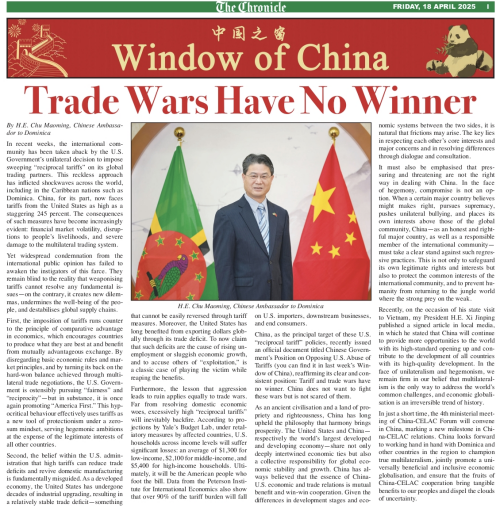
The People’s Republic of China


On April 18th, an article entitled Trade Wars Have No Winner authored by H.E. Chu Maoming, Chinese Ambassador to Dominica, was published in Dominica’s mainstream media The Chronicle. In the article, Ambassador Chu strongly refuted the United States’ practice of launching trade wars and imposing so-called “reciprocal tariffs” in a unilateral and aggressive manner. He emphasized that tariff and trade wars have no winner. China does not want to fight these wars but is not scared of them. Following is the full text of the article:

In recent weeks, the international community has been taken aback by the U.S. government’s unilateral decision to impose sweeping "reciprocal tariffs" on its global trading partners. This reckless approach has inflicted shockwaves across the world, including in the Caribbean nations such as Dominica. China, for its part, now faces tariffs from the United States as high as a staggering 245 percent. The consequences of such measures have become increasingly evident: financial market volatility, disruptions to people’s livelihoods, and severe damage to the multilateral trading system.
Yet widespread condemnation from the international public opinion has failed to awaken the instigators of this farce. They remain blind to the reality that weaponizing tariffs cannot resolve any fundamental issues—on the contrary, it creates new dilemmas, undermines the well-being of the people, and destabilizes global supply chains.
First, the imposition of tariffs runs counter to the principle of comparative advantage in economics, which encourages countries to produce what they are best at and benefit from mutually advantageous exchange. By disregarding basic economic rules and market principles, and by turning its back on the hard-won balance achieved through multilateral trade negotiations, the U.S. Government is ostensibly pursuing “fairness” and “reciprocity”—but in substance, it is once again promoting “America First.” This hypocritical behavior effectively uses tariffs as a new tool of protectionism under a zero-sum mindset, serving hegemonic ambitions at the expense of the legitimate interests of all other countries.
Second, the belief within the U.S. administration that high tariffs can reduce trade deficits and revive domestic manufacturing is fundamentally misguided. As a developed economy, the United States has undergone decades of industrial upgrading, resulting in a relatively stable trade deficit—something that cannot be easily reversed through tariff measures. Moreover, the United States has long benefited from exporting dollars globally through its trade deficit. To now claim that such deficits are the cause of rising unemployment or sluggish economic growth, and to accuse others of “exploitation,” is a classic case of playing the victim while reaping the benefits.
Furthermore, the lesson that aggression leads to ruin applies equally to trade wars. Far from resolving domestic economic woes, excessively high “reciprocal tariffs” will inevitably backfire. According to projections by Yale’s Budget Lab, under retaliatory measures by affected countries, U.S. households across income levels will suffer significant losses: an average of $1,300 for low-income, $2,100 for middle-income, and $5,400 for high-income households. Ultimately, it will be the American people who foot the bill. Data from the Peterson Institute for International Economics also show that over 90% of the tariff burden will fall on U.S. importers, downstream businesses, and end consumers.
China, as the principal target of these U.S. “reciprocal tariff” policies, recently issued an official document titled Chinese Government’s Position on Opposing U.S. Abuse of Tariffs (you can find it in last week’s Window of China), reaffirming its clear and consistent position: Tariff and trade wars have no winner. China does not want to fight these wars but is not scared of them.
As an ancient civilization and a land of propriety and righteousness, China has long upheld the philosophy that harmony brings prosperity. The United States and China—respectively the world’s largest developed and developing economy—share not only deeply intertwined economic ties but also a collective responsibility for global economic stability and growth. China has always believed that the essence of China-U.S. economic and trade relations is mutual benefit and win-win cooperation. Given the differences in development stages and economic systems between the two sides, it is natural that frictions may arise. The key lies in respecting each other’s core interests and major concerns and in resolving differences through dialogue and consultation.
It must also be emphasized that pressuring and threatening are not the right way in dealing with China. In the face of hegemony, compromise is not an option. When a certain major country believes might makes right, pursues supremacy, pushes unilateral bullying, and places its own interests above those of the global community, China—as an honest and rightful major country, as well as a responsible member of the international community—must take a clear stand against such regressive practices. This is not only to safeguard its own legitimate rights and interests but also to protect the common interests of the international community, and to prevent humanity from returning to the jungle world where the strong prey on the weak.
Recently, on the occasion of his state visit to Vietnam, my President H.E. Xi Jinping published a signed article in local media, in which he stated that China will continue to provide more opportunities to the world with its high-standard opening up and contribute to the development of all countries with its high-quality development. In the face of unilateralism and hegemonism, we remain firm in our belief that multilateralism is the only way to address the world’s common challenges, and economic globalization is an irreversible trend of history.
In just a short time, the 4th ministerial meeting of China-CELAC Forum will convene in China, marking a new milestone in China-CELAC relations. China looks forward to working hand in hand with Dominica and other countries in the region to champion true multilateralism, jointly promote a universally beneficial and inclusive economic globalization, and ensure that the fruits of China-CELAC cooperation bring tangible benefits to our peoples and dispel the clouds of uncertainty.


